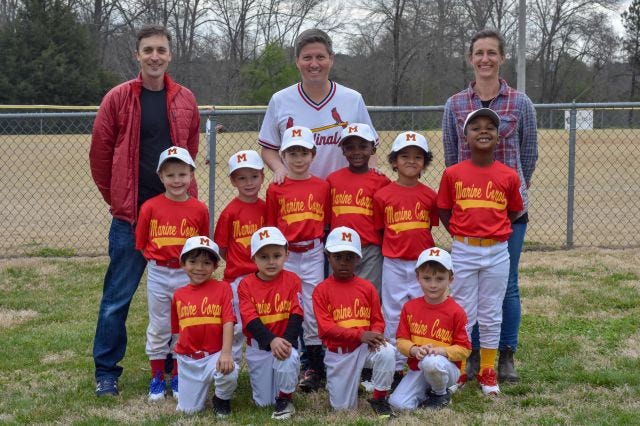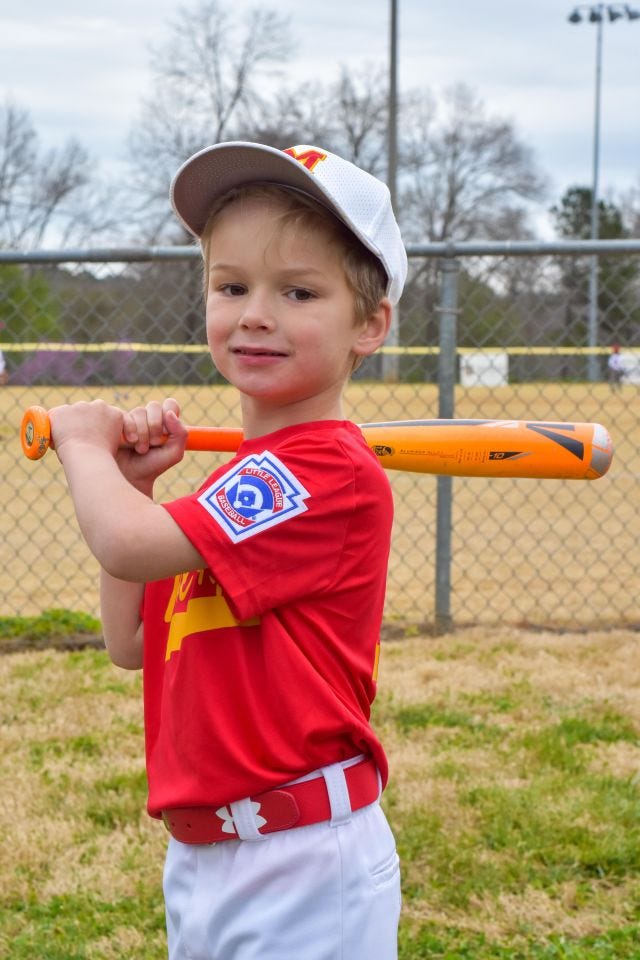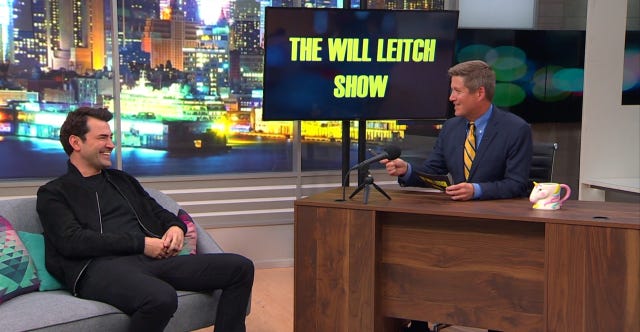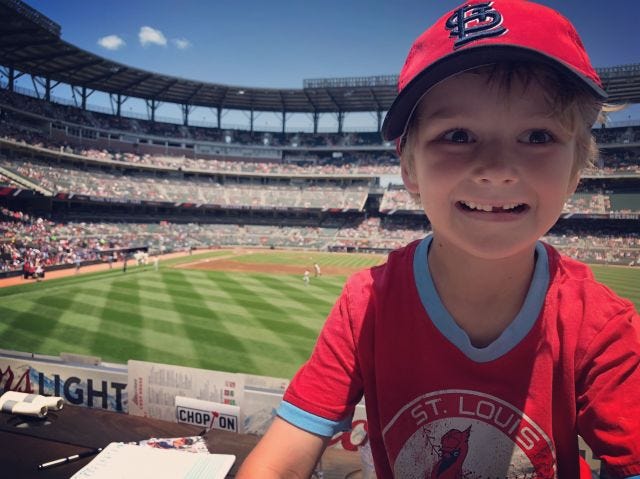Volume 2, Issue 6: Whatever Works
Today is our Little League's team's last game of the year. The baseball season has to end this early in Georgia because it is extremely hot, already. I miss this team and we're not even done yet.

My dad coached me ages 8-10, in Jaycee League, team V.F.W., from 1983-85. I remember all three of these seasons down to the most minute detail. I remember starting out at second base and learning that I loved catching the most, and that's the position I'd play the rest of my baseball years. (It was also the position Dad played.) I remember my first walkoff hit to beat Mitchell-Jerdan Funeral Home. I remember getting hit in the back of the head with a throw during warmups that made me black out. I remember the time that Dad got called out to work 10 minutes before a game started and my mom had to coach. (We won.) I remember the scorebook Mom brought to every game; I still use the same model. I remember all the kids, Ricky Rodgers, Keith Haskett, Jason Morgan, my cousin Denny, Kevin Jones, the kid who died of a burst appendix just a couple of years after our last season ended and made my parents cry for a week. Most of my memories of childhood are snapshots, vivid but fleeting. But I always remember those baseball teams.
I wanted my kids to have that, so when we moved down here, I immediately signed up to be a Little League coach. Now, I don't know if being a Jaycee League coach in Mattoon, Illinois, in 1983 required a coach to deal with the same level of competitiveness as a Little League coach in Athens, Georgia, in 2018 does, but I find myself with a newfound respect for what my dad went through. I love coaching so much. But I love it solely, exclusively, because the kids have so much fun with it, and because they get better, and because they're hopefully developing a deep love of the sport that they'll carry with them for years to come, like I did. I do not love the scoreboard part of it. I do not love that we keep score.
I know that teaching kids the importance of drive -- of knowing that winning is better than losing, that working hard and doing your best can be rewarded in a tangible way, that there is value in achievement -- is a key aspect of youth sports. Understanding the rules, and that you should want to follow them, and that if you do you have a better chance of success, is a big, key lesson. And if I were convinced that every adult involved with youth sports only cared about the scoreboard because they are adhering strictly to that big, key lesson, I woul d have no problems with scoreboards. But I'll confess I am not convinced.
I probably go too far with this. One of the main reasons we keep score in a five-and-six-year-olds' league is just to keep track of the game itself; you can only score five runs in an inning, and it's hard to get three outs in an inning in a league where there are no strikeouts, so looking at the scoreboard at least lets you know when to stop. But the idea that the team that scored more runs than the other was better, or did anything at a higher level than the other team at all (other than having simple dumb luck), is something that scoreboard can't, and shouldn't, reflect. It's just kids running around. They could be on their phones, or stuck in their room, or staring at the television, or just trying to navigate the terrifying world of being a kid. But they're not. They're playing baseball. This is just time where they get to be outside and play.
My No. 1 priority is for them to have the games never feel like school, like something is expected of them. There is plenty of time for that later. From my experience, the kids who stopped playing (and watching) baseball are the ones for whom baseball became just another activity, something else their parents had to drop them off and pick them up for, something else where they were constantly being poked and prodded and judged. If, when I were eight, I'd had a taskmaster of a coach who stuck the worst player in right field every game because he desperately wanted to win, I probably would have stopped liking baseball. I would have seen it as an extension of the mean, self-obsessed world it was beginning to occur to me I might be living in. But instead, baseball became a place I could go to play. It was fun. It always has to be fun first.
So I try to make it fun. We start every game by sprinting around the bases. We call our team the Marine Corps Chickens because they think chickens are funny. (The Marine Corps sponsors our team, and, oddly, this group of five-and-six-year-olds is the only team they sponsor. It's a curious age group to target.) The lineup is randomized before every game. We let everybody play every position, with the exception of first base, because when you're coaching five-and-six-year-olds, you have to have a first baseman who can stop the ball or someone will get hurt. We make sure everyone is always having a good time, at all points.
And we try never to worry about the scoreboard. I am an extremist about this; I don't even like to acknowledge whether a game is won or lost. If every kid out there runs hard and laughs and enjoys himself -- and this league is co-ed, though it turns out that my team is all boys -- then we won. I know that's a little touchy-feely; it eels like something The Federalist will later yell at me about. But I think, particularly at this age, it's uniquely important. They can get all of that they want later in life, and soon.
The parents, I have found, typically understand this, and this year, I've been blessed with other coaches in the league who also get it. But just in case, I'm pretty upfront about it. I start each season with an email that says, to some effect, "if it is important to you that the team your son or daughter wins every game, I am sorry, you got stuck with the wrong coach this year." If you take winning off the board from the beginning, I've found it helps people focus on the actual important things that are happening on the field: That the kid is learning, improving and having a blast. They track actual progress, instead of fake, arbitrary progress.
But I know this is going to get tougher, and quick. This is William's last year in Coach Pitch -- which features the team's coach, me, throwing them pitches, and there are no strikeouts and capped innings and one-hour game windows -- before graduating to Machine Pitch next year. Machine Pitch has strikeouts and extra bases and catchers and all sorts of things that inch you closer to actual baseball. But it also has a massive uptick in importance of the scoreboard.
I had a conversation with a friendly, well-minded, good-hearted friend who coaches in Machine Pitch, the next level up, the other day, and I think it's indicative of the challenge.
Me: So how's Machine Pitch going?
Him: Fun! It's stressful: It's a lot more competitive.
Me: How do you mean?
Him: People are just into it a lot more. You try to win more.
Me: So the kids get more upset when they lose? They play harder to win?
Him: Oh, not really. I don't think they even notice. They prefer saying they won. But I don't think they really even know if they did until the game is over.
Me: So it's us.
Him: How do you mean?
Me: You said the league was more competitive. But if the kids aren't more competitive, then it's us. The adults. We're the ones who are more competitive about it.
Him: Well ... yeah. You wanna win, you know?
I hear about the competitiveness of adults a lot coaching Little League, and I am baffled as to why it is relevant. I mean, I am super competitive myself; I want to do well for myself and my family. But what this competitiveness has to do with six-year-olds playing baseball escapes me. I fear that I am on the wrong side of history here. I fear this is a hill I won't be able to climb. After all, eventually, the parents are going to find it a lot less cute when their coach sends out cheeky self-mocking emails about not caring about winning, and the other coaches will see me less as an idealist and more an easy mark. I'd like to help change that -- to be the change you want to see in the world -- but, you know, I'm a pretty busy guy who's already spread pretty thin; do I want that sort of stress every week? I'm going to be spending the next nine months deciding, I think. Either I'll follow William -- a kid I want to protect from some of the worst tendencies of some bad Little League coaches as much as my dad did for me -- up to Machine Pitch, or I'll go backwards and coach Wynn in T-ball. ( He's pretty good!) But it has to be about the silly, fun play of it. Otherwise, we're turning them into us. They have their whole lives ahead of them to do that on their own.
Until then, I'm just going to enjoy this team. These kids are all great, all their own people in their own unique ways. Getting to know them, and watching them improve and learn and be goofy and run around outside, has been my pleasure this year. I hope they remember this the way I remember my youth baseball. But I mostly just hope they're having fun. I know I sure am.

Here is a numerical breakdown of all the things I wrote this week, in order of what I believe to be their quality. (This is an attempt to have an objective look at the value of my work in a way that I suspect will be difficult to sustain.)
1. The Thirty: The Longest Tenured Player on Every MLB Team, MLB.com. Poor Yadi.
2. The Dodgers Are Going to Be Just Fine, MLB.com. I have to stick with them considering they were my preseason World Series team. (Again.)
3. Debate Club: Best John Williams Scores, SYFY Wire. I totally forgot he did JFK too.
4. This Is the Year the American League's Interleague Streak Finally Ends, MLB.com. It has to.
THE WILL LEITCH SHOW

Everybody knows Ron Livingston from something. (I, weirdly, always think of him from Swingers first.) He was this week's guest on "The Will Leitch Show." You can watch the show on Amazon or on SI TV.
PODCASTS!
Grierson & Leitch, "Tully," our summer movie preview and the terrible "American History X."
Seeing Red, Bernie Miklasz and I recapped that wonderful Cubs series.
Waitin' Since Last Saturday, Tony talks to my favorite Georgia sports blogger.
Oh, also: If you have an Amazon Alexa -- and my family doesn't, for obvious reasons -- you can hear a special show Grierson and I are doing weekly solely for the Amazon Alexa. Read about it here. If you have one, will you try it out and see if it works? I have no idea how to work that weird device.
Have a great weekend, everyone. Say hello to your mother for me. And get thee to a baseball game.

Best,
Will

